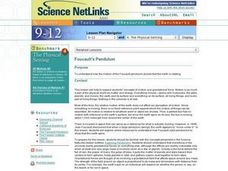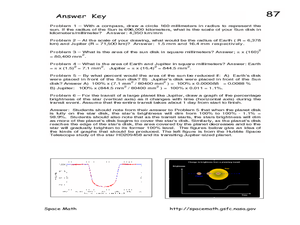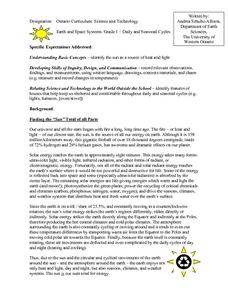Curated OER
The Sun
Students draw diagram of sun and its layers, including photosphere, chromosphere, corona, convection and radiative zones, and core. Students then describe each layer in their own words, define sun spot cycle, and describe solar flares.
Curated OER
Space Science: Journey Through the Solar System
Students explore the Solar System and examine the characteristics of al the planets. Through research and discussion, they create catalogs of the Solar System's components. Next, students use their findings to create Powerpoint...
Curated OER
Timekeeping by the Sun
Students measure shadows to learn about the Sun-Earth relationship. In this astronomy lesson, students create a shadow stick of a Pokemon character and record measurements of its shadow in a data chart. Follow-up discussions guide...
Curated OER
Spotting an Approaching Asteroid or Comet
In this asteroid and comet worksheet, students read about the formula used to determine the brightness of asteroid. They apply this formula to solve 2 problems about asteroids and their brightness.
Curated OER
Space Science
Eighth graders study the objects in our solar system. In this space lesson students identify and describe planets, then classify them as terrestrial or gaseous.
Curated OER
How Many Quasars Are There?
In this quasars worksheet, students read about how astronomers can detect quasars by their luminosity. Students use a given equation to solve 4 problems including finding quasar magnitude, determining the number of quasars with given...
Curated OER
Foucault's Pendulum
High schoolers investigate how the motion of the Foucault pendulum proves that the Earth is rotating. They research the Internet about pendulums and conduct an experiment online. They view a multimedia presentation about pendulums and...
Curated OER
Heliocentric and Geocentric Models
In this worksheet, students read an informational article and view drawings of the two models. In this comprehension worksheet, students answer twelve questions.
Curated OER
Kepler-The Hunt for Earth-like Planets
In this hunt for planets worksheet, students read about the Kepler satellite used to detect exoplanets. Students solve 6 problems including drawing a sun disk and determining the scale in kilometers/millimeter, finding the area of the...
Curated OER
When a Ruler is Too Short
Students measure distances using parallax. In this math lesson, students explain how this method helped astronomers with their studies of the solar system. They determine the length of their arm using parallax and compare it with other...
Curated OER
Gravity Gets You Down
Students investigate the force of gravity and how it effects different objects that are put into acceleration when applied the experiment of free falling. They drop different objects that have a variety of masses and some that cause air...
Curated OER
The Little Fluffy White Cloud
For this reading comprehension worksheet, students read, analyze and interpret the short story "The Little Fluffy White Cloud" and then answer eighteen comprehension questions about the short story.
Curated OER
Nebular Theory-Origin of the Solar System
In this Nebular Theory learning exercise, students are given diagrams of the stages that occurred in the formation of the solar system. They order the diagrams based on the occurrences of each event and answer twelve questions about the...
Curated OER
Galileo Galilei Questions for Study
In this online interactive philosophy worksheet, students respond to 10 short answer and essay questions about Galileo's contributions to science.
Curated OER
Our Place in Space
Third graders identify the different planets that make up the solar system. In this space science lesson, 3rd graders construct a scale model of the major planets. They explore their different unique features and dress up as planets.
Curated OER
Sunny Delight
First graders explore completing experiments through the scientific method.
Curated OER
WEAVING TECHNOLOGY INTO THEMATIC UNITS T.O.O.L.S. 2000
Third graders utilize computers and other technology to explain the solar system. Ten different stations involve students through laserdisc, research, art, GeoSafari, space toys, and the computer.
Curated OER
Daily and Seasonal Cycles
First graders identify the sun as a source of heat and light. They identify features of houses that help keep use sheltered and comfortable throughout daily and seasonal cycles. Students are told that summer is the best season to...
Curated OER
Lars the Little Polar Bear
In this reading comprehension online interactive activity, students view a video on the book, The Little Polar Bear The Snow Storm, by Jamaniace. Students choose the multiple choice answer that completes 9 facts from the video.
Curated OER
DEW POINT
Fourth graders investigate conditions causing saturation and measure the dew point of the atmosphere performing simple experiments.
Curated OER
Sucking Students into an Understanding of Air Pressure and Vacuums
Students develop and test their ideas about air pressure and vacuums by conducting several investigations into the movement of fluids in tubes.
Curated OER
Science: Bees: An Interdisciplinary Approach
Students investigate the world of bees and describe their characteristics. by identifying the bees' parts, they demonstrate how these parts function. In the lab, students dissect bees and view the various parts under microscopes. ...
Curated OER
Social Studies: Adinkra Printing
First graders demonstrate a sense of artistic composition by creating shapes and symbols in the pattern of African Adinkra printing. They use glue to create a raised design and then print it on colored paper. Students use symbols from...
Curated OER
Sky 3: Modeling Shadows
Students will construct models to demonstrate their understanding of shadows. Many questions and suggestions for variants on the activities are presented to allow you to tailor this lesson to your particular needs. It is best to make the...

























